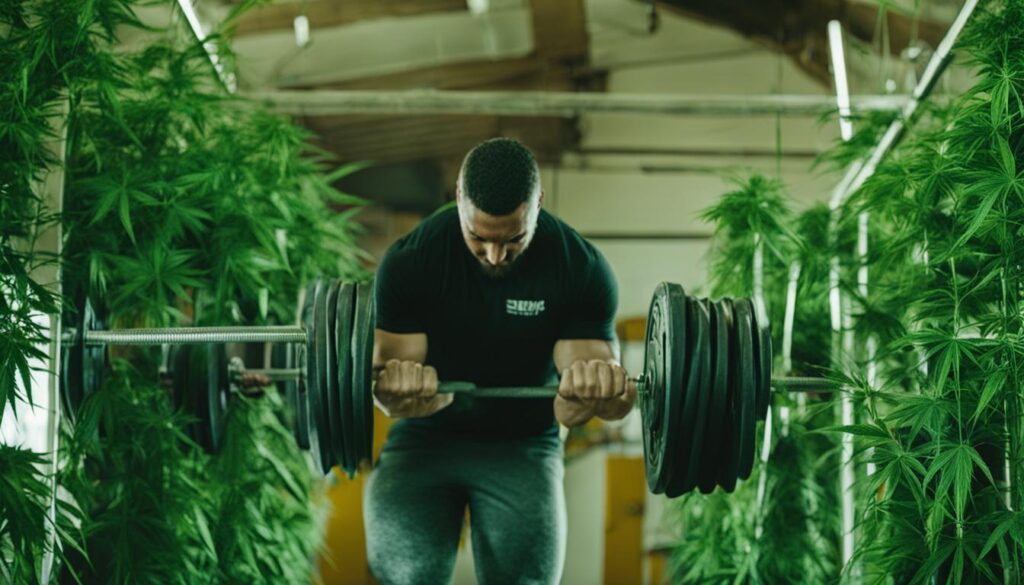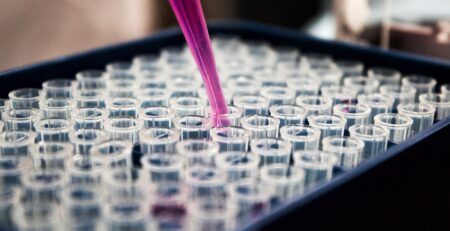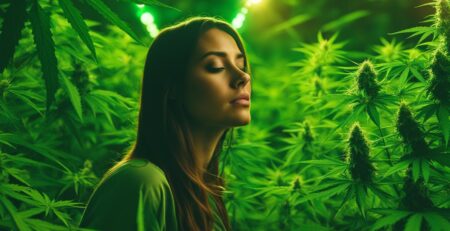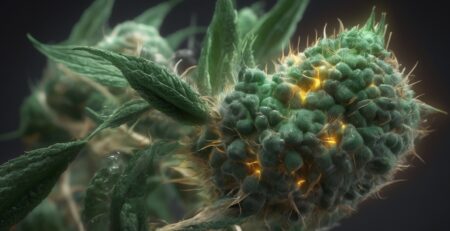In-Depth Analysis: CBD for Muscle Recovery
The use of cannabidiol (CBD) among athletes is becoming more widespread, especially since it has been removed from the list of prohibited substances by sports organizations. However, the evidence supporting the use of CBD for muscle recovery is still limited and inconclusive. There is a need for more research to understand the physiological pathways and mechanisms through which CBD may contribute to muscle recovery. Previous studies have suggested that CBD has potential anti-inflammatory, antioxidant, anxiolytic, and antidepressant properties, which could aid in recovery from fatigue and muscle damage. Additionally, CBD may have potential effects on sleep, exercise-induced injury, and fatigue-related symptoms. More studies are needed to fully understand the benefits and risks of using CBD for muscle recovery in athletes.
Key Takeaways:
- CBD is gaining popularity among athletes for muscle recovery, but the evidence supporting its use is limited.
- Research suggests that CBD may have anti-inflammatory, antioxidant, anxiolytic, and antidepressant properties.
- CBD's potential effects on sleep, exercise-induced injury, and fatigue-related symptoms require further investigation.
- Athletes should be cautious and ensure CBD products are free of prohibited substances to comply with anti-doping rules.
- Future research should focus on determining optimal dosages, administration methods, and long-term effects of CBD on muscle recovery.
The Importance of Recovery in Sports Performance
Recovery plays a vital role in sports performance, as it allows athletes to replenish their energy, repair damaged tissues, and optimize their physiological and cognitive functions. Fatigue, both central and peripheral, is a common result of physical exercise and can manifest as pain, weakness, inflammation, decreased mobility, and overall tiredness.
Athletes employ various strategies to enhance recovery, including the use of plant-derived products like CBD. These products have shown potential anti-inflammatory, antioxidative, and analgesic effects, which can aid in muscle recovery and reduce fatigue-related symptoms.
“Recovery is an essential part of any athlete's training regimen. It allows the body to repair and adapt, leading to improved performance,” says Dr. Karen Smith, a sports scientist.
“CBD has shown promise in its potential to reduce inflammation and pain, which are common barriers to optimal recovery. Its natural properties make it an attractive option for athletes looking for alternative recovery methods,” Dr. Smith adds.
Table: Recovery Modalities
| Modality | Description | Benefits |
|---|---|---|
| Rest | Allowing time for the body to recuperate and recharge | Reduces fatigue, promotes healing |
| Nutrition | Providing the body with essential nutrients for repair | Supports muscle recovery and growth |
| Hydration | Maintaining proper fluid balance in the body | Aids in nutrient transport and waste removal |
| Active Recovery | Engaging in low-intensity exercises to promote blood flow | Enhances muscle repair and reduces muscle soreness |
| CBD | Using CBD products to potentially reduce inflammation and pain | Aids in muscle recovery and fatigue reduction |
While CBD holds promise as a recovery modality, it is important to note that individual responses may vary. Athletes should consult with healthcare professionals and adhere to relevant regulations and guidelines before incorporating CBD into their recovery routine.
The Growing Use of CBD Among Athletes
The use of CBD among athletes has been on the rise in recent years, especially since its legalization and commercialization. With the removal of CBD from the list of prohibited substances in many sports organizations, more and more athletes are turning to CBD as a potential aid in their recovery. CBD, or cannabidiol, is a natural compound derived from the cannabis plant that is known for its potential therapeutic benefits.
While CBD use among athletes is becoming more prevalent, it is important to note that not all CBD products are created equal. Some products may still contain significant levels of other banned cannabinoids, such as THC, which could result in athletes unknowingly violating anti-doping rules. Athletes must exercise caution and ensure that the CBD products they use are free of prohibited substances.
The growing use of CBD among athletes highlights the need for further research and education. More studies are needed to explore the efficacy and safety of CBD in the context of sports performance and recovery. It is crucial for athletes, coaches, and sports organizations to stay informed about the potential benefits and risks associated with CBD use.
“CBD use among athletes is on the rise, but it is important to ensure that the products used are free of prohibited substances. Education and further research will help athletes make informed decisions about CBD use for their recovery and overall well-being.”
As CBD continues to gain popularity among athletes, it is likely that regulations and guidelines will evolve to accommodate its use. With a better understanding of CBD's effects and proper product labeling, athletes can make informed decisions about incorporating CBD into their recovery regimens.
The Effects of CBD on Physiological and Cognitive Functions
CBD interacts with the endocannabinoid system in the body, specifically the CB1 and CB2 receptors, leading to various physiological and cognitive effects. CBD can influence the release of neurotransmitters like serotonin and dopamine, regulate mood and anxiety, and inhibit the degradation and uptake of endocannabinoids like anandamide, resulting in increased endocannabinoid-receptor binding. These effects are associated with pain relief, anti-inflammatory properties, neuroprotective effects, and modulation of oxidative stress.
The endocannabinoid system plays a crucial role in maintaining homeostasis and regulating various physiological processes, including energy balance, immune function, and pain perception. The activation of CB1 receptors, primarily located in the central nervous system, can result in analgesic effects and modulation of pain signaling pathways. CBD's interaction with CB1 receptors may contribute to its potential analgesic effects, making it a potential tool for managing pain associated with muscle recovery.
Additionally, CBD's interaction with CB2 receptors, which are predominantly found in immune cells, can lead to anti-inflammatory effects. CBD has been shown to modulate immune response, reduce the production of pro-inflammatory cytokines, and inhibit inflammatory signaling pathways. These anti-inflammatory effects may contribute to the reduction of inflammation and promote faster recovery from muscle damage.
Furthermore, CBD has been linked to neurogenesis, the process of generating new neurons in the brain. It has been suggested that CBD may promote neurogenesis and protect against cognitive decline and neurodegenerative diseases. These cognitive effects may have implications for athletes in terms of cognitive function, memory, and learning.
| Effects of CBD on Physiological and Cognitive Functions | |
|---|---|
| Pain Relief | CBD interacts with CB1 receptors, resulting in analgesic effects and modulation of pain signaling pathways. |
| Anti-Inflammatory Effects | CBD interacts with CB2 receptors, leading to reduced production of pro-inflammatory cytokines and inhibition of inflammatory signaling pathways. |
| Neurogenesis | CBD has been shown to promote neurogenesis, which may have implications for cognitive function and brain health. |
| Oxidative Stress | CBD has been found to modulate oxidative stress and protect against oxidative damage. |
Muscle Recovery and CBD: Can CBD Improve the Healing Process?
Muscle recovery is a crucial aspect of athletic performance, and finding effective methods to enhance this process is a top priority for athletes. One potential avenue that has gained attention is the use of cannabidiol (CBD). CBD has been suggested to have anti-inflammatory and antioxidative properties, which may aid in the recovery of muscles from damage caused by strenuous exercise. Additionally, CBD's potential analgesic effects could alleviate muscle soreness and pain, allowing athletes to bounce back more quickly. However, while the potential benefits of CBD for muscle recovery appear promising, further research is needed to fully understand its optimal use and long-term effects.
Inflammation and oxidative stress are common consequences of muscle damage resulting from intense physical activity. CBD's anti-inflammatory and antioxidative properties may help reduce these symptoms, allowing for a faster healing process. By targeting the underlying causes of muscle damage, CBD could potentially aid in the recovery of athletes and improve their overall performance.
Recovery modalities play an essential role in the rehabilitation process. CBD products, such as topicals and oils, are increasingly being incorporated into athletes' recovery routines. These products can be applied directly to the affected muscles, providing localized relief and potentially speeding up the healing process. However, it is important to note that CBD is not a miracle solution; it should be used in conjunction with other recovery methods, such as rest, proper nutrition, and physical therapy.
| Benefits of CBD for Muscle Recovery | Considerations |
|---|---|
|
|
While CBD shows promise as a potential aid in muscle recovery, it is crucial to approach its use with caution. Athletes should consult with healthcare professionals knowledgeable about CBD and its potential benefits and risks. Additionally, athletes need to ensure that the CBD products they use are free of prohibited substances and comply with anti-doping regulations. This is especially important as some CBD products may contain trace amounts of tetrahydrocannabinol (THC), the psychoactive compound found in cannabis, which is still considered a prohibited substance in many sports organizations.
Overall, CBD holds promise as a natural option for athletes seeking to optimize their muscle recovery. With further research and a better understanding of its optimal use, CBD may become a valuable tool in the arsenal of recovery modalities available to athletes.
Sleep Quality and CBD’s Impact on Recovery
Quality sleep is essential for athletes to effectively recover and optimize their performance. CBD has shown potential in improving sleep quality, particularly in individuals experiencing sleep disturbances such as insomnia and nightmares. By promoting better sleep, CBD may contribute to enhanced recovery and overall well-being in athletes.
The use of CBD has been studied for its potential to reduce sleep latency, improve sleep continuity, and enhance subjective sleep quality. Athletes often face challenges in getting adequate rest due to the physical and mental demands of training and competition. CBD's anxiolytic effects may help reduce anxiety and promote relaxation, leading to improved sleep quality.
It is worth noting that more research is needed to fully understand the effects of CBD on sleep and recovery in athletes. The optimal dosage and administration method of CBD for sleep improvement are still being explored. Additionally, individual responses to CBD may vary, and it is important for athletes to consult with healthcare professionals before incorporating CBD into their sleep and recovery routines.
The Benefits of CBD for Sleep and Recovery:
- Potential reduction in sleep disturbances such as insomnia and nightmares
- Improved sleep latency and continuity
- Enhanced subjective sleep quality
- Reduction in anxiety and promotion of relaxation
“CBD has shown potential in improving sleep quality, particularly in individuals experiencing sleep disturbances such as insomnia and nightmares.”
As research continues to uncover the potential benefits of CBD for sleep and recovery, athletes should approach its use with caution. Ensuring the safety and legality of CBD products is crucial, as some products may contain higher levels of other banned cannabinoids. It is recommended that athletes choose CBD products that are third-party tested and certified to be free of prohibited substances.
In conclusion, CBD holds promise as a natural option for athletes looking to improve sleep quality and aid in the recovery process. However, further research is needed to determine the optimal use of CBD for sleep improvement and its long-term effects on athletes. With careful consideration and guidance from healthcare professionals, athletes can explore the potential benefits of CBD in optimizing their sleep and overall performance.
CBD’s Potential Effects on Stress and Mood Regulation
The use of CBD has shown potential in reducing stress, relieving anxiety, and regulating mood. CBD has anxiolytic effects, meaning it can help reduce feelings of anxiety and promote a sense of calm and relaxation. This can be particularly beneficial for athletes who often experience high levels of stress and pressure.
Additionally, CBD has been studied for its potential antidepressant effects. It may help improve mood and alleviate symptoms of depression, which can significantly impact an athlete's mental well-being. By promoting a more positive mental state, CBD may contribute to enhanced overall mood and well-being during training and competition.
Research has also suggested that CBD's effects on stress and mood regulation may be due to its interaction with the endocannabinoid system, specifically the CB1 receptors. CBD can modulate the release of neurotransmitters like serotonin and dopamine, which play a crucial role in regulating mood and anxiety. By influencing these neurotransmitters, CBD may help athletes manage stress more effectively and maintain a more balanced emotional state.
Benefits of CBD for Stress and Mood Regulation:
- Reduces feelings of anxiety and promotes relaxation
- May alleviate symptoms of depression
- Helps manage stress and maintain a balanced emotional state
It is important to note that individual responses to CBD may vary, and more research is needed to fully understand its effects on stress and mood regulation. Athletes considering the use of CBD for these purposes should consult with a healthcare professional to determine the appropriate dosage and ensure it aligns with their specific needs and circumstances.

Considerations and Future Research on CBD for Muscle Recovery
When considering the use of CBD for muscle recovery, it is important to take into account various factors such as dosage, administration method, safety, and long-term effects. While CBD shows promise as a potential aid in muscle recovery, more research is needed to fully understand its optimal use and potential risks.
Firstly, determining the appropriate dosage of CBD for muscle recovery is crucial. Currently, there is limited information available on the optimal dosage for athletes. Future research should aim to investigate different dosing regimens and their effects on muscle recovery. It is also essential to consider individual factors such as body weight, metabolism, and sensitivity to CBD when determining the appropriate dosage.
Another important consideration is the administration method of CBD. There are various ways to consume CBD, including oral ingestion, sublingual administration, topical application, and inhalation. Each method may have different bioavailability and absorption rates, which can affect the effectiveness of CBD in muscle recovery. Future studies should explore the impact of different administration methods on the outcomes of CBD use for muscle recovery.
Ensuring the safety of CBD products is also crucial. While CBD itself is generally considered safe, it is essential to ensure that the products are free from contaminants and meet quality standards. Long-term effects of CBD on muscle recovery also need to be investigated to understand any potential risks or benefits associated with prolonged use.
Research Gaps and Future Studies
Despite the growing interest in CBD for muscle recovery, there are significant research gaps that need to be addressed. Future studies should aim to provide more comprehensive evidence on the specific mechanisms and pathways through which CBD affects muscle recovery. Additionally, there is a need for randomized controlled trials with larger sample sizes to validate the findings of preliminary studies and establish the efficacy of CBD for muscle recovery.
Moreover, research should focus on the potential interactions between CBD and other medications or supplements commonly used by athletes. Understanding these interactions is essential to ensure the safe and effective use of CBD in the context of muscle recovery.
In conclusion, while CBD holds promise as a natural option for supporting muscle recovery in athletes, there are several considerations and research gaps that need to be addressed. Future studies should investigate the optimal dosage, administration methods, safety, and long-term effects of CBD for muscle recovery. Only with robust evidence and thorough research can athletes and healthcare professionals make informed decisions regarding the use of CBD in optimizing muscle recovery.

Conclusion
In-Depth Analysis: CBD for Muscle Recovery
In conclusion, CBD has become increasingly popular among athletes as a potential aid in muscle recovery. Its potential anti-inflammatory, antioxidative, analgesic, anxiolytic, and antidepressant effects make it an attractive option for athletes looking to optimize their performance. However, it is important to note that more research is still needed to fully understand the optimal dosage, administration method, and long-term effects of CBD on muscle recovery in athletes.
Athletes should exercise caution when using CBD products, ensuring that they are free of any prohibited substances and comply with anti-doping regulations. Furthermore, it is crucial to consider safety considerations and potential interactions with other medications or supplements. Future studies should aim to fill the existing research gaps and provide more comprehensive evidence regarding the use of CBD for muscle recovery in athletes.
Overall, CBD offers a natural alternative for athletes seeking to enhance their recovery and optimize their performance. As its popularity continues to grow, further research will provide a clearer understanding of CBD's potential benefits and risks, ultimately benefiting athletes in their pursuit of peak physical performance.
FAQ
What is CBD?
CBD, short for cannabidiol, is a compound derived from the cannabis plant. Unlike THC, another compound found in cannabis, CBD does not produce psychoactive effects.
Can CBD help with muscle recovery?
While there is limited research on the topic, CBD has shown potential anti-inflammatory and antioxidative properties, which could aid in muscle recovery. However, more studies are needed to fully understand its effects.
How does CBD affect the body?
CBD interacts with the endocannabinoid system in the body, specifically the CB1 and CB2 receptors. This interaction can lead to various physiological and cognitive effects, including pain relief, anti-inflammatory properties, and regulation of mood and anxiety.
What are the potential benefits of CBD for muscle recovery?
CBD has been suggested to have anti-inflammatory, antioxidative, and analgesic effects, which may help reduce inflammation, oxidative stress, muscle soreness, and pain associated with exercise-induced muscle damage.
Can CBD improve sleep quality for athletes?
CBD has been studied for its potential to improve sleep quality and reduce symptoms of insomnia. Better sleep can contribute to enhanced recovery and overall well-being in athletes.
Does CBD have any effects on stress and mood regulation?
CBD has shown potential anxiolytic and antidepressant effects, which can be beneficial for athletes who experience high levels of stress and pressure. It may promote relaxation and reduce anxiety, contributing to a more positive mental state.
Are there any risks or considerations associated with using CBD for muscle recovery?
The optimal dosage, administration method, and long-term effects of CBD on muscle recovery are still being studied. Athletes should also ensure that the CBD products they use are free of prohibited substances and comply with anti-doping regulations.
Is more research needed on CBD for muscle recovery?
Yes, there are still research gaps in understanding the specific mechanisms and pathways through which CBD affects muscle recovery. Future studies should aim to provide more comprehensive evidence on the use of CBD for muscle recovery in athletes.
Source Links
- https://www.ncbi.nlm.nih.gov/pmc/articles/PMC8369499/
- https://www.ncbi.nlm.nih.gov/pmc/articles/PMC10403841/
- https://www.frontiersin.org/articles/10.3389/fphar.2023.1210202











Leave a Reply